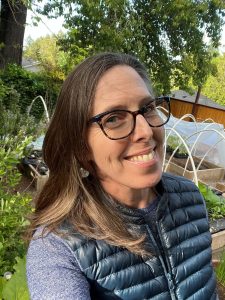

Jen’s research interests lie in the development of relationships and shared goals to inform the co-creation of public information and policy. Through this, she strives to advocate for the diverse perspectives of First Nations partners, other levels of government, interest holders, and all British Columbians.
She currently serves as a Director in the BC Provincial Ministry of Water, Lands and Resource Stewardship, lending her expertise to conservation, governance, and anti-racism initiatives. In the past, she has held leadership positions in emergency planning, recovery, and risk reduction, with experience spanning the Provincial Ministries of Health, Indigenous Relations and Reconciliation, and Emergency Management and Climate Readiness at the Government of British Columbia. She holds degrees in Biology and Natural Resources, with several global post-doctoral fellowships and field work in the Canadian High Arctic under her belt.
We learned more about Jen’s work in the BC Public service as well as her interest in biodiversity conversation and disaster risk mitigation in our Q&A with her below:
What has been a meaningful moment in your career that underscores the need for good public policy?
I’ve worked in public policy-related roles within the BC Public Service for nearly a decade, so it’s hard to point to just one meaningful moment. Broadly speaking, the most impactful experiences have been those where clear guidance, defined responsibilities, and support for the public—or for public values—were urgently needed.
I’ve been both privileged and challenged to work on issues that carry a deeply emotional weight. The extent to which provincial policy either helped to reduce public concern and confusion—or failed to—has left a lasting impression on me.
Two areas stand out that have had both positive and difficult dimensions: supporting communities as they recover from flood and wildfire disasters, and upholding public expectations that the province will safeguard our living natural resources while also fostering a strong economy. These are deeply complex issues that can become sources of division, but thoughtful, well-communicated public policy has the power to bridge those divides.
What are you most looking forward to engaging in as an SPPGA Practitioner Fellow?
Prior to joining the public service, I had the good fortune to teach, research and work closely with students and colleagues at various international institutions. I truly miss the academic environment, so I am especially looking forward to being immersed in new ideas and fresh perspectives. I’m grateful for the opportunity to connect with and learn from UBC SPPGA graduate students, faculty, and fellow practitioners.
As an SPPGA Practitioner Fellow, my primary goal is to help build a deeper understanding of the interconnectedness between healthy, functioning ecosystems and the real-world services they provide. I specifically hope to surface and address any gaps in public knowledge and provincial policy related to the value and success of using natural solutions for disaster risk mitigation. My intention is to instill conservation-based risk reduction measures as a principle for community-level planning that is supported by provincial policy.


